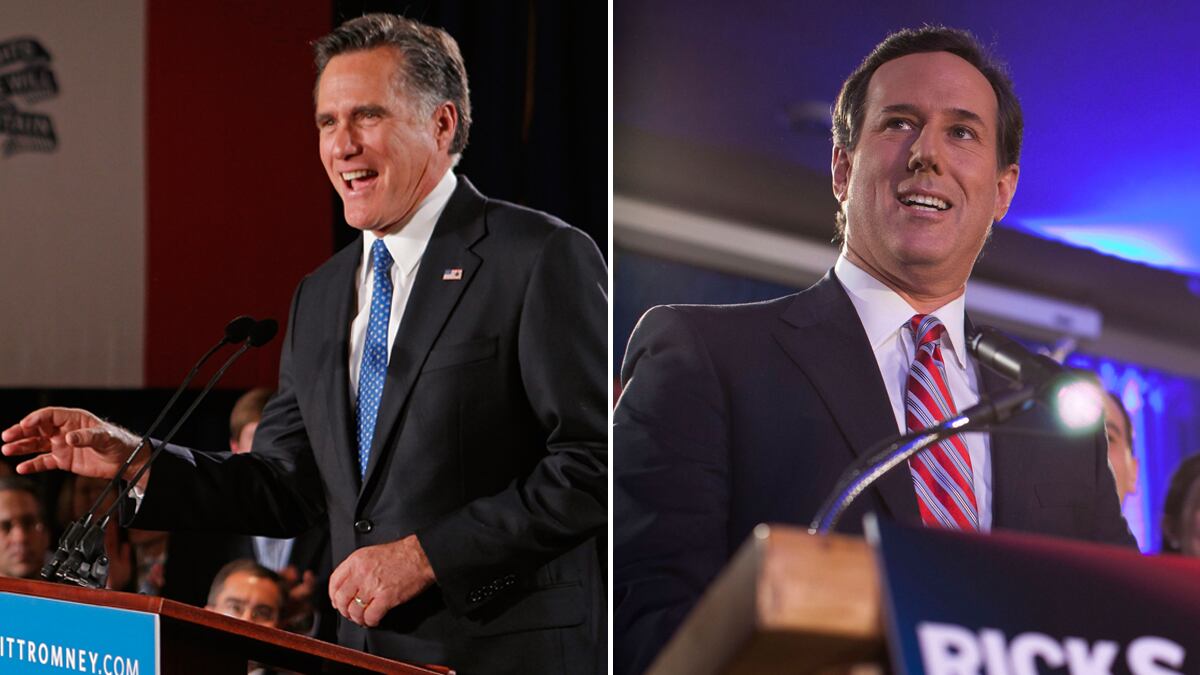The dramatic results of the Iowa caucuses bring good news and better news for the Republican Party and its prospects for November.

First, the virtual tie for first place between Mitt Romney and Rick Santorum all but guarantees that the GOP won’t need to endure a long, bitter, scorched-earth fight for the presidential nomination. Santorum lacks the funding, infrastructure, or name identification to win next week in New Hampshire or in other early primaries—especially since the candidates who will be able to continue their campaigns for now (Gingrich in South Carolina and probably Florida; Ron Paul—with his fanatical-but-distinctly-limited following—nearly everywhere) are far more likely to take votes from Santorum than from Romney.
Most important, the substantial segment of the Republican electorate that wants, above all, to find the most electable contender to end Obama’s Reign of Error will recoil from Santorum’s strident stands on social issues—and that includes many (like me) who share the former senator’s conservative values. Most right-wingers understand that if the fall campaign focuses on jobs, economic insecurity, fiscal mismanagement, and runaway spending, we win; if, on the other hand, the debate concentrates on banning gays in the military again, or criminalizing abortion even in cases of rape and incest, the president could win reelection in a walk.
In his excellent victory speech, Senator Santorum effectively articulated themes of economic growth and enhanced opportunity, and spoke movingly about his own family’s pursuit of the American Dream. But Santorum won’t be able to choose his own issues as the campaign moves forward—neither the president in the fall campaign, nor the mainstream media in televised debates and elsewhere, nor the cascade of super-PAC negative advertising about to wash over the Pennsylvanian’s boyish head, will allow Santorum to avoid revisiting his own wildly controversial past statements on immigration, abortion, marriage, gay rights, and much more. Every day that political argument concentrates on these cultural issues is another day that Barack Obama dodges responsibility for the dismal economic record that deserves to bring him down.
Some observers claim a protracted nomination fight would help energize the Republicans like the epic battle of Barack vs. Hillary energized Democrats four years ago. But both Obama and Clinton were well-known, well-liked candidates among the liberal base, while Romney and Santorum (not to mention the unelectable Dr. Demento) lack that sort of following or affection among Republicans. What’s more, if the nomination remained undecided through the California primary on June 6, the waste of money (sure to run to hundreds of millions) would drain conservative resources that otherwise could help defeat Obama and Senate Democrats. Fortunately, the intraparty struggle will run out of steam long before a potential Golden State donnybrook, which gives Republicans enhanced opportunities for early unity and focus on the obamanations of the current administration.
The even better news from a GOP (and American) viewpoint involves the little-noted religious message from the Iowa tally. In a state that’s about 60 percent Protestant (with Republican voters estimated as more than 70 percent Protestant) the four non-Protestant GOP contenders (Mormons Romney and Huntsman; Catholics Santorum and Gingrich) won a combined total of nearly two thirds of the Republican votes. The two candidates who made the biggest point of stressing their own Evangelical Christian faith (Rick Perry and Michele Bachmann) won a combined total of less than 16 percent—in a state where their fellow Evangelicals famously dominate the GOP.
This means that for all the media canards about the alleged narrow-mindedness of Born Again Christians in Iowa and elsewhere, the state’s most fervent believers understand that shared values matter more than common theology. They overwhelmingly voted for upstanding individuals like Santorum and Romney, despite the fact that some of their religious leaders still persist in viewing Catholics and Mormons with generalized suspicion.
Sure, this unheralded open-mindedness represents good news for Mitt and his minions, but it’s also good news for the nation at large that continues to move past a sometimes bitter and bigoted past.






